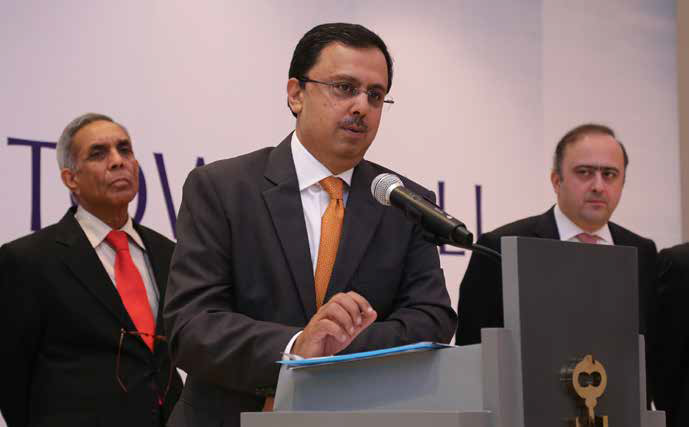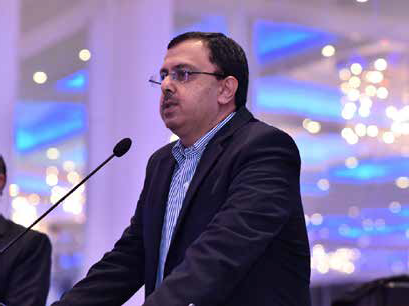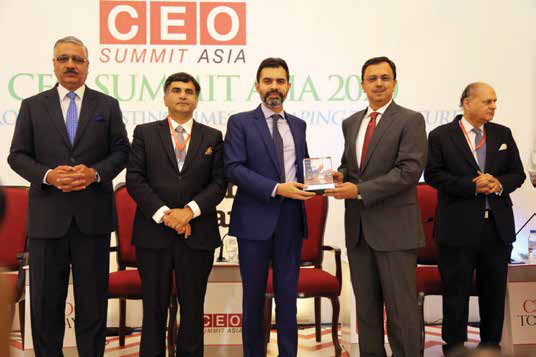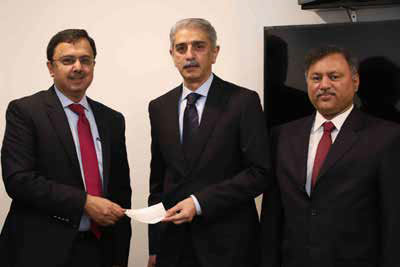YOUSUF HUSSAIN – PRESIDENT & CEO, FAYSAL BANK LIMITED
An exclusive interview with the President and CEO of Faysal Bank, Yousaf Hussain, in recognition of his tremendous role in the transformation of a conventional bank to an Islamic bank.
The Islamic banking industry has huge market potential and a high growth trend, with a market share exceeding 16% of the total banking assets and deposits. There is a strong preference for Islamic banking in Pakistan with almost 13% of the adult population citing religious concerns as a reason for not having an account at a financial institution. Under the National Financial Inclusion Strategy (2018), the Government of Pakistan’s top priority is to enhance the share of Islamic banking in terms of deposit volumes and branch network. Currently, the Islamic branch network constitutes over 18.5% of country’s total branch network.
A number of conventional and Islamic banks in Pakistan are developing new Islamic products in order to offer a substitute for conventional products currently available. There has been robust growth in the Islamic banking deposits. Since 2014 the overall banking industry grew at a CAGR of 7.8%, whereas the Islamic banking deposits recorded a growth of 15.5%, which is more than the deposit growth of conventional banks.
Capitalising on the available market opportunity within the fast-growing Islamic banking sector in Pakistan and in line with the parent group’s intent, Faysal Bank embarked upon Islamic transformation.
Yousaf Hussain, the President & CEO of Faysal Bank, has around 25 years of diverse professional experience. He has led a number of landmark international Investment Banking & Structured Finance transactions across multiple industries and has been at the forefront of two bank acquisitions and integration transactions. He has been with Faysal Bank since August 2008 and has contributed significantly to the growth of the franchise while holding senior management positions. It is under his leadership, that the Islamic financings and deposits have grown at an accelerated CAGR of 28% and 13% respectively on the back of the Bank’s clear strategic roadmap to convert into a full-fledged Islamic bank from a conventional bank.
“TRANSFORMATION OF FAYSAL BANK FROM A CONVENTIONAL BANK TO A FULL-FLEDGED ISLAMIC BANK CAN BE REGARDED AS ONE OF THE LARGEST TRANSFORMATIONS EVER TAKEN PLACE IN THE FINANCIAL WORLD.”
What inspired you towards Islamic banking?
YH: Islam places great emphasis on a complete code of life and as Muslims, it is incumbent upon us to follow the teachings and guidelines of Shari’a and implement them in our daily life as much as possible. In my various professional roles, I was exposed to Islamic banking and its fundamentals, and the more I learnt the more.
I was drawn towards it. At a very basic level, one of the fundamental tenets of belief is that of ‘Rizq’ – if the Almighty is providing for you, then it is incumbent upon us to use this ‘Rizq’ in ways He has specified. In this regard, given the clear and unambiguous injunctions against
Riba, one of the simplest changes one can make to comply with the guidelines of Islam is the selection of Islamic banking when choosing their banking partner so that the blessings and wealth provided by Allah is also managed by us in a way, which is within acceptable Shari’a guidelines.
Also, over the past many years, Islamic banking has evolved and is now at par in terms of products and services with any conventional bank and all of these products and services are certified not only by a fully qualified team of Shari’a scholars but also regulated by the Central Bank, which ensures the compliance of Islamic products with Shari’a/Islamic injunctions and structures.
So, with all other things being equal, there is now a clear advantage in selecting an Islamic bank and in selecting Islamic banking products. At Faysal Bank, not only do we try to embody this belief, but also look at it as a strong business proposition given the Muslim-majority market, we operate in.
How have your previous experiences shaped you and assisted you in the current role?
YH: I have been associated with Faysal Bank for over a decade in several diversified roles across different geographies and over the past three years, I have been serving the organisation in the role of President and CEO.
It has been an interesting journey – I initially started as an engineer and my initial career choices were primarily technical. Thereafter,
I joined ABN AMRO one of the premier multinational banks in Pakistan at the time and during my association with the organisation, I was fortunate to get significant international exposure as well the opportunity to explore a number of different business areas. After ABN AMRO, I was involved with another foreign bank – SAMBA – a very large bank in the Middle East. They had recently acquired a bank in Pakistan and hired me as part of the initial management team, where I worked on the integration and transformation process.

All these experiences in diverse organisations and roles gave me hands-on knowledge of various functional areas. My experience has helped provide me with a better context as I, along with my team, execute this large-scale conversion of Faysal Bank, which entails significant growth and business model changes as well.

Faysal Bank Limited (FBL) Islamic Banking has (over the years) developed its internal capability (systems, procedures, processes, Shari’a & State Bank of Pakistan approvals) to offer a complete range of Islamic banking products and variants. These products are offered in various Islamic modes including Murabaha; diminishing Musharakah; Istisna; Ijarah; running Musharakah; Musawamah; inter-bank Musharakah; Islamic Export Refinance Scheme (IERS) and Islamic Long-Term Financing Facility (ILTFF).
The Bank is providing Shari’a-compliant solutions to its customers on the corporate and commercial banking side. Salam and Tijarah financing have been introduced to service trade and agriculture-based customers. Other value-added products are also expected to be launched soon including; Currency bai Salam and Tawwaruq-based products, while the Shari’a-compliant credit card structure along with the accounting opinion has been submitted to SBP for approval. With the introduction of an Islamic credit card, Faysal Bank would become the only bank to provide a complete suite of consumer banking products under Shari’a-compliant modes.
The Bank re-launched a completely revamped Islamic Kamil business account to serve its high-net-worth customers. It has also launched a Shari’a-compliant Takaful Health coverage, as well as in collaboration with Jubilee Life, has introduced unit linked product catering to medium- and long-term needs of Islamic banking customers.
“DIGITAL CHANNELS, APPS AND INTERNET BANKING PORTALS, DIGITAL MARKETING, DATA AND AUTOMATION, ALL OF THESE NOT ONLY IMPROVE THE CUSTOMER’S CONVERSION EXPERIENCE BUT ALSO IMPROVE THE EFFICIENCY OF THE BANK ITSELF.”
What role can technology play in easing the conversion for Faysal Bank, in particular, and the proliferation of Islamic banking, in general?
YH: Technology is a great enabler as well as an equalizer – with the right technology platforms and business models we have global examples of small challenger banks taking on much larger banks.
Digital channels, Apps and Internet Banking portals, Digital Marketing, Data and Automation, all of these not only improve the customer’s conversion experience but also improve the efficiency of the bank itself – it is a virtuous cycle. For Faysal Bank, digital and technology as an enabler are key focus areas. We have invested significantly in this area and are now starting to reap the benefits. As we automate and digitise our products and services’ delivery mechanisms, we are able to serve them through our Faysal Digibank app and internet banking platform. This is resulting in cost reduction, and increasing flexibility and customer satisfaction.
How has the general public and clients reacted to the conversion of Faysal Bank to an Islamic bank? Did you face any criticism or hindrances?
YH: In general, we have received support and good wishes on our transformation journey both from existing customers as well as from prospective ones. Our prospective customers understand the difficult journey we have taken and are generally keen to support and assist us by moving business to us. For us, our existing customers were a litmus test, however, most have been very supportive and in general have shown no concerns as they continue to be served by the same staff they have been dealing with from the same branches they are familiar with. The only difference being that they now have an even wider range of innovative Islamic products and services to choose from.

An automated utility has been developed and implemented in the core banking system for a seamless branch conversion. This unique functionality enables the bank to convert the deposit accounts from conventional to Islamic without any change in the account number, debit card and chequebook. This utility has allowed the bank to speed up the conversion process with minimum customer inconvenience.

Faysal Bank can vaunt of the largest network of Islamic banking branches within Islamic banking windows, with its footprint already in over 200 cities with 555 branches (including 414 Islamic branches) till December 2019. The Bank is aggressively expanding its branch network, with 50 new Islamic branches planned to be opened in 2020.
The Islamic branch representation in the entire existing branch network is around 74.5% with plans to reach to over 89% by the end of 2020. At the end of 2019, the Bank had successfully converted 64 conventional branches to Islamic and a further 84 conventional branches are in the process of conversion during 2020, on the back of system support and operational preparedness.
Faysal Bank recently won the GIFA for the Best Emerging Islamic Bank 2020. What impact, do you think, this achievement will have on the conversion of Faysal Bank?
YH: I think this prestigious award is a clear reflection of the efforts the Faysal Bank team has put into the conversion and transformation process over the past many years. I think a recognition like this not only increases our motivation but is also a highly visible sign for all stakeholders that FBL is a bank that stands apart in terms of our overall value proposition.
As a CEO, what is your leadership style?
YH: As a CEO, I am relatively hands-on, given the sort of uncharted waters Faysal Bank is navigating in terms of transformation and aggressive organic growth. I remain deeply engaged with my team to get their feedback on challenges they may be facing and to provide them with any support that they may require to execute their agenda. In general, my preference is to focus on both the big picture as well as the component moving parts – how we do things is as important as what we do.
Management Training programmes are introduced with a focus on onboarding fresh graduates with Islamic banking certifications, while Islamic banking experience is preferred while hiring sales and relationship teams. To further infuse the Islamic banking culture within the organisation, a separate Islamic Code of Conduct has also been rolled-out.
How did you motivate your staff towards a joint objective of achieving a complete transformation of Faysal Bank towards Islamic banking and finance?
YH: This was not an easy thing as the transformation brings in a lot of business complexities, which would otherwise not be present in a steady-state environment, including product knowledge, new systems, new business models etc.
The key to bringing everyone on the same page, however, was a very clear direction that this is going to happen so that ambiguity was removed and people understood that regardless of the difficulties and challenges, this was the destination model, which the bank would be moving towards. Simultaneously, we embarked on a wide-scale training programme for all levels of staff within the organisation.
This included both practical training related to products, structures, services etc. as well as more big-picture training in terms of why Islamic banking, its logic and benefits. These training and sessions were designed to be as interactive as possible so that people could understand why we were doing this and eliminate any misconceptions they might have.

Ultimately the belief to travel on this difficult path has to come from within ones’ self and we tried to provide our staff with the knowledge and assistance they needed and required to make this decision. I am happy to say that while there were challenges initially, we are now all focused collectively on ensuring the success of the conversion and we are within sight of our goal.
In terms of products transformation, all auto & mortgage financings are booked only under the Islamic structure, with a majority of the long-term financing being either booked under Islamic structure or the sell-down option. The Bank has also achieved significant conversions of corporate and commercial banking loans into Islamic ones.
The Bank recently invested into PKR35 billion energy Sukuks, primarily to create a cushion to meet its upcoming SLR (Statutory Liquidity Ratio) requirements pertaining to the conversion of Islamic deposit branches.
Faysal Bank has also entered into a partnership with IBA-CEIF Karachi and IM Science-CEIF Peshawar for the promotion of Islamic banking in Pakistan. In this regard, the Bank has donated PKR10 million and PKR5 million to the institutions respectively.
How do you think institutions can play their role in the development of Islamic banking and finance in the country?
YH: I think Pakistan has a very strong potential to further grow Islamic banking given the Muslim majority nature of the population and the strong intrinsic demand for Islamic banking, which shows up in every survey related to financial inclusion. In this regard, I feel that
the regulator has put into place a very strong enabling environment and we can see that various banks are trying to take advantage of this by putting up Islamic windows or separate Islamic banks. The way to further grow this market is the continued expansion of the network, a focus on innovative product development and increased education of the customer base.
You won the GIFA Excellence award 2020 for your leadership role in the transformation of the bank and its marketing strategy. What will be your focus for the next 12-18 months in terms of achieving goals for the bank, especially in these uncertain times?
YH: It is expected that there will be continued uncertainty over the next 12-18 months as we and the world at large deal with COVID-19.
There are a whole host of economic challenges as well as unprecedented changes in consumer demand and preferences, which are all evolving rapidly. To ensure that we are able to deliver on our goals our focus is threefold.
The Bank will continue to follow the strategy of responsible conversion to Islamic banking through preserved shareholders value and depositor’s interests, with significant conversion targeted to be achieved during 2020-2023.
- We are increasing our communication with our customers to ensure that we stay close to them and are able to better
understand their evolving needs while also communicating solutions to the challenges they may now be facing.
- We are trying to cut down our time to market new initiatives through automation as well as improved internal efficiencies so that we are faster and better positioned to execute customer expectations.
- We are increasing the pace of our Islamic transformation as well as digital transformation as we are seeing that the preference of customers for both is continuously increasing. We are certain that our focus on these three key areas in addition to our already defined strategy will help FBL meet stakeholder expectations during these challenging times.
What message would you like to give to the younger generation of Islamic banking and finance practitioners?
YH: Islamic banking is the future, as it holds immense promise for growth. We derive at this conclusion by studying its rapidly increasing market potential and growth trends.
The growing population of nearly all Muslim-majority countries, coupled with the relative growth in their cumulative GDP, indicates that the need for relevant Islamic banking products and services will continue to increase.
As a result, there will be high demand for finance and business graduates, combined with Islamic banking expertise who can effectively identify these evolving market needs and present coherent solutions accordingly.
This is where our younger generation comes in. In collaboration with prominent universities and educational institutes, Faysal Bank Limited has been contributing to develop & offer Islamic banking programmes.
Our aim is to develop experts who can cater to this specialised market in the best possible way. This will also benefit them in return and open new career growth opportunities worldwide.



